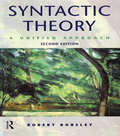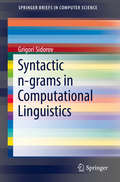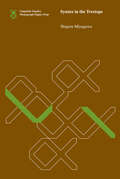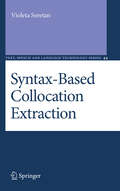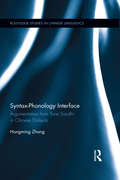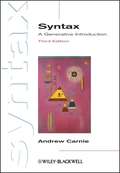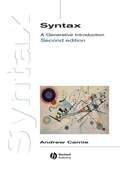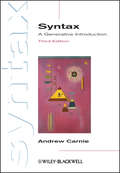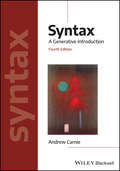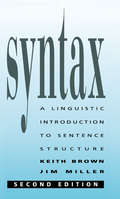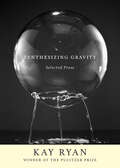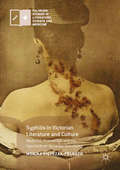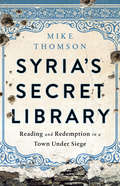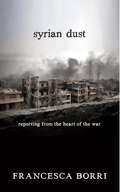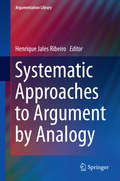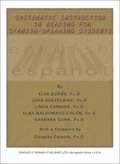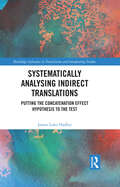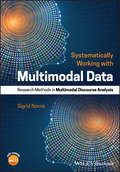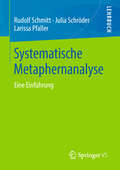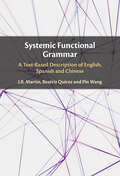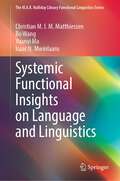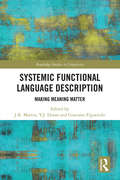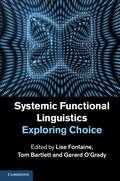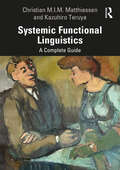- Table View
- List View
Syntactic Theory: A Unified Approach
by Robert BorsleySyntactic theory is central to the study of language. This innovative book introduces the ideas which underlie most approaches to syntax and shows how they have been developed within two broad frameworks: principles and parameters theory and phrase structure grammar. While other texts either concentrate on one theory or treat them as totally separate, here both approaches are introduced together, highlighting the similarities as well as the differences.Thoroughly updated in the light of major recent developments, this second edition includes expanded explanations of the main characteristics of the two theories, summaries of the main features, exercises reinforcing key points and suggestions for further investigation.
Syntactic n-grams in Computational Linguistics (SpringerBriefs in Computer Science)
by Grigori SidorovThis book is about a new approach in the field of computational linguistics related to the idea of constructing n-grams in non-linear manner, while the traditional approach consists in using the data from the surface structure of texts, i.e., the linear structure.In this book, we propose and systematize the concept of syntactic n-grams, which allows using syntactic information within the automatic text processing methods related to classification or clustering. It is a very interesting example of application of linguistic information in the automatic (computational) methods. Roughly speaking, the suggestion is to follow syntactic trees and construct n-grams based on paths in these trees. There are several types of non-linear n-grams; future work should determine, which types of n-grams are more useful in which natural language processing (NLP) tasks. This book is intended for specialists in the field of computational linguistics. However, we made an effort to explain in a clear manner how to use n-grams; we provide a large number of examples, and therefore we believe that the book is also useful for graduate students who already have some previous background in the field.
Syntax
by Robert FreidinSyntax: Basic Concepts and Applications provides a systematic introduction to core topics in syntax, focusing on how the basic concepts apply in the analysis of sentences. Assuming no background in linguistic analysis, the book gives students a working knowledge of syntactic analysis from a minimalist perspective. Step by step it explains the fundamentals of phrase structure, movement and deletion. Well-placed exercises throughout reinforce and extend the concepts and analyses presented in the text, allowing readers to gain understanding of progressively complex issues at a comfortable pace. Much of the data comes from English, but crucial examples are also drawn from a range of other languages, including Russian, Chinese, Japanese, French, Italian, Spanish, Irish, Welsh and Greek.
Syntax in the Treetops (Linguistic Inquiry Monographs)
by Shigeru MiyagawaA proposal that syntax extends to the domain of discourse in making core syntax link to the conversational context.In Syntax in the Treetops, Shigeru Miyagawa proposes that syntax extends into the domain of discourse by making linkages between core syntax and the conversational participants. Miyagawa draws on evidence for this extended syntactic structure from a wide variety of languages, including Basque, Japanese, Italian, Magahi, Newari, Romanian, and Spanish, as well as the language of children with autism. His proposal for what happens at the highest level of the tree structure used by linguists to represent the hierarchical relationships within sentences—&“in the treetops&”—offers a unique contribution to the new area of study sometimes known as &“syntacticization of discourse.&” Miyagawa&’s main point is that syntax provides the basic framework that makes possible the performance of a speech act and the conveyance of meaning; although the role that syntax plays for speech acts is modest, it is critical. He proposes that the speaker-addressee layer and the Commitment Phrase (the speaker&’s commitment to the addressee of the truthfulness of the proposition) occur together in the syntactic treetops. In each succeeding chapter, Miyagawa examines the working of each layer of the tree and how they interact.
Syntax-Based Collocation Extraction
by Violeta SeretanSyntax-Based Collocation Extraction is the first book to offer a comprehensive, up-to-date review of the theoretical and applied work on word collocations. Backed by solid theoretical results, the computational experiments described based on data in four languages provide support for the book's basic argument for using syntax-driven extraction as an alternative to the current cooccurrence-based extraction techniques to efficiently extract collocational data. The work described in Syntax-Based Collocation Extraction focuses on using linguistic tools for corpus-based identification of collocations. It takes advantage of recent advances in parsing to propose a novel deep syntactic analytic collocation extraction that has applicability to a range of important core tasks in Computational Linguistics. The book is useful for anyone interested in computational analysis of texts, collocation phenomena, and multi-word expressions in general.
Syntax-Phonology Interface: Argumentation from Tone Sandhi in Chinese Dialects (Routledge Studies in Chinese Linguistics)
by Hongming ZhangThis book centers on theoretical issues of phonology-syntax interface based on tone sandhi in Chinese dialects. It uses patterns in tone sandhi to study how speech should be divided into domains of various sizes or levels. Tone sandhi refers to tonal changes that occur to a sequence of adjacent syllables or words. The size of this sequence (or the domain) is determined by various factors, in particular the syntactic structure of the words and the original tones of the words. Chinese dialects offer a rich body of data on tone sandhi, and hence great evidence for examining the phonology-syntax interface, and for examining the resulting levels of domains (the prosodic hierarchy). Syntax-Phonology Interface: Argumentation from Tone Sandhi in Chinese Dialects is an extremely valuable text for graduate students and scholars in the fields of linguistics and Chinese.
Syntax: A Generative Introduction
by Andrew CarnieAndrew Carnie's bestselling textbook on syntax has guided thousands of students through the discipline of theoretical syntax; retaining its popularity due to its combination of straightforward language, comprehensive coverage, and numerous exercises.
Syntax: A Generative Introduction
by Andrew CarnieBuilding on the success of the bestselling first edition, the second edition of this textbook provides a comprehensive and accessible introduction to the major issues in Principles and Parameters syntactic theory, including phrase structure, the lexicon, case theory, movement, and locality conditions.
Syntax: A Generative Introduction (Introducing Linguistics #18)
by Andrew CarnieAndrew Carnie’s bestselling textbook on syntax has guided thousands of students through the discipline of theoretical syntax; retaining its popularity due to its combination of straightforward language, comprehensive coverage, and numerous exercises. In this third edition, topics have been updated, new exercises added, and the online resources have been expanded. Supported by expanded online student and instructor resources, including extra chapters on HPSG, LFG and time-saving materials for lecturers, including problem sets, PowerPoint slides, and an instructors’ manual Features new chapters on ellipsis, auxiliaries, and non-configurational languages Covers topics including phrase structure, the lexicon, Case theory, movement, covert movement, locality conditions, VP shells, and control Accompanied by a new optional workbook, available separately, of sample problem sets which are designed to give students greater experience of analyzing syntactic structure
Syntax: A Generative Introduction (Introducing Linguistics #30)
by Andrew CarnieThe extensively updated fourth edition of the leading introductory textbook on theoretical syntax, including an all-new chapter and additional problem sets Now in its fourth edition, Andrew Carnie's Syntax: A Generative Introduction remains the leading introduction to the rules, principles, and processes that determine the structure of sentences in language. Comprehensive yet accessible, the text provides a well-balanced, student-friendly introduction to syntactic theory. Topics include phrase structure, the lexicon, binding theory, case theory, movement, covert movement, locality conditions, ditransitives, verbal inflection and auxiliaries, ellipsis, control theory, non-configurational languages, and more. Students are provided with numerous exercises and pedagogical features designed to strengthen comprehension, review learning objectives, test knowledge, and highlight major issues in the field. The fourth edition features revised material throughout, including a new section on Chomsky's Merge and additional problem sets in every chapter, while new examples throughout the text broaden the appeal and relatability of the text to a more diverse set of students. The optional The Syntax Workbook: A Companion to Carnie's Syntax has also been thoroughly revised and expanded to offer students the opportunity to practice the skills and concepts introduced in the primary text. This classic textbook: Presents authoritative and comprehensive coverage of basic, intermediate, and advanced topics Includes ample exercises and clear explanations using straightforward language Offers extensive online student and instructor resources, including problem sets, PowerPoint slides, an updated instructor's manual, author-created videos, online-only chapters, and other supplementary material Features a wealth of learning tools, including learning objectives, discussion questions, and problems of varying levels of difficulty In the new fourth edition, Syntax: A Generative Introduction remains an essential textbook for beginning syntacticians, perfect for undergraduate and graduate course in linguistics, grammar, language, and second language teaching. Available as a set with The Syntax Workbook: A Companion to Carnie's Syntax, 2nd Edition
Syntax: A Linguistic Introduction to Sentence Structure
by Keith Brown Jim MillerThe second edition of this invaluable introductory text takes account of developments in syntactic studies. Dealing with the whole range of syntax, this book explains, in a lucid and approachable way, why linguists have adopted certain solutions to problems and not others. This book introduces the basic concepts used in the description of syntax, independently of any single model of grammar. Profusely illustrated with diagrams, there are sets of exercises for every chapter which can be used in class or by students working independently.
Synthesizing Gravity: Selected Prose
by Kay RyanThe first-ever collection of essays by one of our most distinguished poets, the Pulitzer Prize–winner and former Poet Laureate of the United States.Synthesizing Gravity gathers for the first time a thirty-year selection of Kay Ryan’s probings into aesthetics, poetics, and the mind in pursuit of art.A bracing collection of critical prose, book reviews, and her private previously unpublished soundings of poems and poets—including Robert Frost, Stevie Smith, Marianne Moore, William Bronk, and Emily Dickinson—Synthesizing Gravity bristles with Ryan’s crisp wit, her keen off-kilter insights, and her appetite and appreciation for the genuine. Among essays like “Radiantly Indefensible,” “Notes on the Danger of Notebooks,” and “The Abrasion of Loneliness,” are piquant pieces on the virtues of emptiness, forgetfulness and other under-loved concepts. Edited and with an introduction by Christian Wiman, this generous collection of Ryan’s distinctive thinking gives us a surprising look into the mind of an American master.“Synthesizing Gravity is a delight, if a tart and idiosyncratic one . . . If Ryan gives us a view through a keyhole, it’s a view often made richer by its constraints.” —The New York Times Book Review“Reading Ryan’s writing will charge and recharge the mind . . . a wonderful entry point to her work.” —San Francisco Chronicle“Brilliant . . . For poetry enthusiasts and skeptics alike, this will be an inviting portal into the mind of one of America’s greatest living writers.” —Publishers Weekly (starred review)“Damn fine prose . . . What a wonderful voice [Ryan] displays.” —John Freeman, “Lit Hub’s Most Anticipated Books of 2020”
Syphilis in Victorian Literature and Culture: Medicine, Knowledge and the Spectacle of Victorian Invisibility (Palgrave Studies in Literature, Science and Medicine)
by Monika Pietrzak-FrangerThis book addresses the evident but unexplored intertwining of visibility and invisibility in the discourses around syphilis. A rethinking of the disease with reference to its ambiguous status, and the ways of seeing that it generated, helps reconsider the network of socio-cultural and political interrelations which were negotiated through syphilis, thereby also raising larger questions about its function in the construction of individual, national and imperial identities. This book is the first large-scale interdisciplinary study of syphilis in late Victorian Britain whose significance lies in its unprecedented attention to the multimedia and multi-discursive evocations of syphilis. An examination of the heterogeneous sources that it offers, many of which have up to this point escaped critical attention, makes it possible to reveal the complex and poly-ideological reasons for the activation of syphilis imagery and its symbolic function in late Victorian culture.
Syria's Secret Library: Reading and Redemption in a Town Under Siege
by Mike ThomsonThe remarkable story of a small, makeshift library in the town of Daraya, and the people who found hope and humanity in its books during a four-year siege.Daraya lies on the fringe of Damascus, just southwest of the Syrian capital. Yet for four years it lived in another world. Besieged by government forces early in the Syrian Civil War, its people were deprived of food, bombarded by heavy artillery, and under the constant fire of snipers. But deep beneath this scene of frightening devastation lay a hidden library. While the streets above echoed with shelling and rifle fire, the secret world below was a haven of books.Long rows of well-thumbed volumes lined almost every wall: bloated editions with grand leather covers, pocket-sized guides to Syrian poetry, and no-nonsense reference books, all arranged in well-ordered lines. But this precious horde was not bought from publishers or loaned by other libraries--they were the books salvaged and scavenged at great personal risk from the doomed city above.The story of this extraordinary place and the people who found purpose and refuge in it is one of hope, human resilience, and above all, the timeless, universal love of literature and the compassion and wisdom it fosters.
Syrian Dust: Reporting from the Heart of the War
by Anne Milano Appel Francesca BorriAugust 21, 2013: a chemical weapons attack on the suburbs of Damascus reminds the world of the existence of the Syrian war. Hundreds of journalists from every corner of the world rush to the frontier only to leave disappointed when Obama decides not to bomb. They leave behind 200,000 estimated victims, and more than half of a population of 22 million people dispersed or refugeed in nearby countries: the worst humanitarian crisis since WWII according to the UN.Francesca Borri is one of them. But she does not leave. She is thirty years old. For months she covers the battle of Aleppo as a freelance reporter. And she quickly realizes that to report a war is to hide with dozens of women and children, even a baby, born there, in a grave, 'a piece of soil under the ground that is as expensive as three houses' or to scavenge for anything to burn for some warmth, 'a broken slipper, the plastic hand of a toy' or to mistake bloody figments of skull for rubble. To report a war is also to meet with officials more worried about the stain of snow on their Clarks than the people they are supposed to help. It is to explain what is happening in Aleppo to journalists who have only been there once, on vacation, and bought a carpet. It is risking one's life because of the jealousy of a fellow reporter. And it is also about dreaming of driving at night with the windows open, about remembering impossible little things, the particular light on that day in that café at the beach when you were a kid, the eyes of people you love, all the minuscule simple joys that can be lost in a moment. Syrian Dust is a raw and powerful account of the Syrian war that throws the reader right in the middle of it, without any shelter.From the Trade Paperback edition.
Systematic Approaches to Argument by Analogy
by Henrique Jales RibeiroThe present volume assembles a relevant set of studies of argument by analogy, which address this topic in a systematic fashion, either from an essentially theoretical perspective or from the perspective of it being applied to different fields like politics, linguistics, literature, law, medicine, science in general and philosophy. All result from original research conducted by their authors for this publication. Thus, broadly speaking, this is an exception which we find worthy of occupying a special place in the sphere of the bibliography on the argument by analogy. In effect, most of the contexts of the publications on this topic focus on specific areas, for example everyday discourse, science or law theory, while underestimating or sometimes even ignoring other interdisciplinary scopes, as is the case of literature, medicine or philosophy. The idiosyncrasy of this volume is that the reader and the researcher may follow the development of different theoretical outlooks on argument by analogy, while measuring the scope of its (greater or lesser) application to the aforementioned areas as a whole.
Systematic Instruction in Reading For Spanish Speaking Students
by Elva DuranThis text will help in the preparation of primary grade teachers throughout the United States, so that they may be successful with Hispanic students entering public school with little or no English background.
Systematically Analysing Indirect Translations: Putting the Concatenation Effect Hypothesis to the Test (Routledge Advances in Translation and Interpreting Studies)
by James Luke HadleyThis volume applies digital humanities methodologies to indirect translations in testing the concatenation effect hypothesis. The concatenation effect hypothesis suggests that indirect translations tend to omit or alter identifiably foreign elements and also tend not to identify themselves as translations. The book begins by introducing the methodological framework to be applied in the chapters that follow and providing an overview of the hypothesis. The various chapters focus on specific aspects of the hypothesis that relate to specific linguistic, stylistic, and visual features of indirect translations. These features provide evidence that can be used to assess whether and to what extent the concatenation effect is in evidence in any given example. The overarching aim of the book is not to demonstrate or falsify the veracity of the concatenation effect hypothesis or to give any definitive answers to the research questions posed. Rather, the aim is to pique the curiosity and provoke the creativity of students and researchers in all areas of translation studies who may never have considered indirect translation as relevant to their work.
Systematically Working with Multimodal Data: Research Methods in Multimodal Discourse Analysis
by Sigrid NorrisA guide that offers a step-by-step process to data-driven qualitative multimodal discourse analysis Systematically Working with Multimodal Data is a hands-on guide that is theoretically grounded and offers a step-by-step process to clearly show how to do a data-driven qualitative Multimodal Discourse Analysis (MDA). This full-color introductory textbook is filled with helpful definitions, notes, discussion points and tasks. With illustrative research examples from YouTube, an Experimental and a Video Ethnographic Study, the text offers many examples of how to deal with small to large amounts of data, including information on how to transcribe video data multimodally, including online videos, and how to analyze the data. This textbook contains ample theory, directions for literature, and a teaching guide to help with a clear understanding of how to work with multimodal data. Contains new research data, exceptional illustrations and diagrams Offers step-by-step processes of working through examples, transcriptions and online videos Goes into great depth so that students can use the book as hands-on material to engage with their own data analysis Designed to be easy-to-use with color-coded definitions, tasks, discussion points and notes Written for advanced undergraduate, graduate and PhD level students, as well as participants in research workshops, Systematically Working with Multimodal Data is an authoritative guide to understanding data-driven qualitative Multimodal Discourse Analysis.
Systematische Metaphernanalyse: Eine Einführung
by Rudolf Schmitt Julia Schröder Larissa PfallerDie Analyse von Metaphern hat sich als neuer Weg zu den Deutungen entwickelt, in denen Menschen sich und ihre Welt begreifen. Dieses Lehrbuch führt in den am weitesten entwickelten Metaphernbegriff der kognitiven Linguistik ein und skizziert eine Methode für verlässliche Rekonstruktion der metaphorischen Konstruktionen von Selbst und Welt.
Systemic Functional Grammar: A Text-Based Description of English, Spanish and Chinese
by Pin Wang J.R. Martin Beatriz QuirozSystemic Functional Linguistics (SFL) is a usage-based theory of language, founded on the assumption that language is shaped entirely by its various functions in the contexts in which it used. The first of its kind, this book advances SFL by applying it comparatively to English, Spanish and Chinese. By analysing English alongside two other, typologically very different major world languages, it shows how SFL can effectively address two central issues in linguistics – namely typology and universals. It concentrates in particular on argumentation, carefully explaining how descriptions of nominal group, verbal group and clause systems and structures are motivated, and draws on examples from key texts which display a full range of ideational, interpersonal and textual grammar resources. By working across three world languages from a text-based perspective, and demonstrating how grammar descriptions can be developed and improved, the book establishes the foundations for a groundbreaking functional approach to language typology.
Systemic Functional Insights on Language and Linguistics (The M.A.K. Halliday Library Functional Linguistics Series)
by Bo Wang Christian M.I.M. Matthiessen Yuanyi Ma Isaac N. MwinlaaruThis book features a collection of 10 interviews with Christian M.I.M. Matthiessen, who is a key figure in Systemic Functional Linguistics (SFL) and has collaborated closely with M.A.K. Halliday since the 1980s. As noted by Professor Chang Chenguang, Editor of the M.A.K. Halliday Library Functional Linguistics Series, “this collection of interviews serves as an important reference for scholars and students of SFL. It provides a unique perspective on the theoretical development and future outlooks of SFL, as well as Matthiessen’s own interpretations of the theory. It also enriches our understanding of SFL and is a very useful addition to the series.” Written in an engaging dialogic format, the book paints a vivid picture of SFL thriving among the landscape of general linguistics and of SFL as an important tool now being applied in various areas.
Systemic Functional Language Description: Making Meaning Matter (Routledge Studies in Linguistics)
by J. R. Martin Y. J. Doran Giacomo FigueredoThis volume showcases previously unpublished research on theoretical, descriptive, and methodological innovations for understanding language patterns grounded in a Systemic Functional Linguistic perspective. Featuring contributions from an international range of scholars, the book demonstrates how advances in SFL have developed to reflect the breadth of variation in language and how descriptive methodologies for language have evolved in turn. Taken together, the volume offers a comprehensive account of Systemic Functional Language description, providing a foundation for practice and further research for students and scholars in descriptive linguistics, SFL, and theoretical linguistics.
Systemic Functional Linguistics
by Lise Fontaine Lise Fontaine Tom Bartlett Gerard O'Grady Tom BartlettThis stimulating volume provides fresh perspectives on choice, a key notion in systemic functional linguistics. Bringing together a global team of well-established and up-and-coming systemic functional linguists, it shows how the different senses of choice as process and as product are interdependent, and how they operate at all levels of language. Taking an interdisciplinary approach, it covers a range of linguistic viewpoints, informed by evolutionary theory, psychology, sociology and neuroscience, to produce a complex but unifying account of the issues. This book offers a critical examination of choice and is ideal for students and researchers working in all areas of functional linguistics as well as cognitive linguistics, second language acquisition, neurolinguistics and sociolinguistics.
Systemic Functional Linguistics: A Complete Guide
by Kazuhiro Teruya Christian M.I.M. MatthiessenThis user-friendly student guide is the essential resource for all those engaged in studying systemic functional linguistics (SFL). Assuming no prior knowledge, this guide is divided into nine chapters which can be read independently of one another and used for purposes of reference. The reading section maps out and mediates the key SFL literature. The application guides show how SFL has been and can be applied to various domains, from translation to healthcare communication. The term guides demystify the core terminology and the vocabulary guides aid readers in dealing with the most commonly used terms in text analysis. Systemic Functional Linguistics is an invaluable guidebook for all those studying functional grammar and SFL within linguistics, applied linguistics and related courses.
